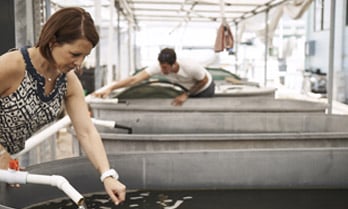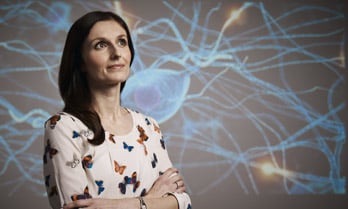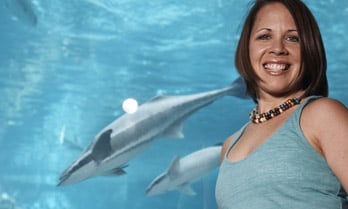Dr Jodie Rummer, marine biologist, James Cook University, Townsville
08 September 2015
A hot future for sharks
Dr Jodie Rummer swims with sharks for her research. She is fascinated by fish and their ability to deliver oxygen to their muscles 20 to 50 times more efficiently than we can. Her global research into salmon, mackerel, hagfish, and now sharks explains why fish dominate the oceans, and has given her the opportunity to swim with sharks in the world’s largest shark sanctuary, in French Polynesia.
Her L’Oréal-UNESCO For Women in Science Fellowship will help her predict how sharks and other fish will cope with rapidly changing oceans. Some will be winners, some will be losers as the climate changes. That’s a problem not just for the oceans, but also for the communities that depend on fish for protein.
“Fish have been on the planet for hundreds of millions of years. It’s up to us to ensure they’re here for the next 100 million years.”
Qualifications
| 2010 | PhD (comparative animal physiology), University of British Columbia, Vancouver, Canada |
| 2004 | Master of Science, University of West Florida |
| 1999 | Bachelor of Science (Honours), University of West Florida, USA |
| 1997 | Associate of Science (Honours), Lincoln Land College, Illinois, USA |
Career highlights, awards, fellowships, grants
| 2015-2017 | ARC Discovery Early Career Researcher Award (DECRA), Physiological performance of reef fishes under ocean acidification |
| 2015–2016 | Chief Investigator, Australian Museum, Lizard Island Reef Research Foundation Fellowship |
| 2015 | George A. Bartholomew Award, Society for Integrative and Comparative Biology |
| 2015 | George A. Bartholomew Award presentation, Society for Integrative and Comparative Biology annual meeting, West Palm Beach, USA |
| 2014 | Invited presentation, TEDx talks, James Cook University, Cairns |
| 2014 | Chief Investigator, Institute for Pacific Coral Reefs Fellowship |
| 2013 | International Research Network Biodiversity of Coral Reefs workshop, Groupement de Recherche International (GDRI), Paris, France |
| 2013 | Australian Academy of Sciences, Japan-Australia marine science workshop, Tokyo, Japan |
| 2013 | Principal Investigator, National Geographic Society grant |
| 2013 | Journal of Experimental Biology and Society for Experimental Biology travel and research awards (also received in 2012 and 2008) |
| 2013 | Invited presentation, Ecofisiologia Centro de Investigação Interdisciplinar Marinha e Ambiental (CIIMAR), Porto, Portugal |
| 2012 | Invited presentation, Society for Experimental Biology, Salzburg, Austria |
| 2011 | Visiting Fellow, National Fisheries College Institute of Sustainable Marine Resources, Papua New Guinea |
| 2011 | Australian Research Council Super Science Fellowship |
| 2010–2011 | Collaboration with Professor DJ Randall, Hong Kong, China |
| 2008 | Invited presentation, Young Scientist of the Year Award Symposium, Marseille, France |
| 2007–2008 | Visiting Research Fellow, with Professor M Berenbrink, University of Liverpool, UK |
Top five publications
Rummer JL, McKenzie DJ, Innocenti A, Supuran CT, Brauner CJ (2013) Root effect haemoglobin may have evolved to enhance general oxygen delivery, Science 340: 1327–1329. (Impact factor 31.480, 26 citations)
Rummer JL, Couturier CS, Stecyk JAW, Gardiner NM, Kinch JP, Nilsson GE, Munday PL (2014) Life on the edge: Thermal optima for aerobic scope of equatorial reef fishes are close to current day temperatures, Global Change Biology 20: 1055–1066. (Impact factor 8.224, 11 citations)
Rummer JL, Brauner CJ (2011) Plasma-accessible carbonic anhydrase at the tissue of a teleost fish may greatly enhance oxygen delivery: in vitro evidence in rainbow trout, Oncorhynchus mykiss, Journal of Experimental Biology 214: 2319–2328. (Impact factor 3.00, 13 citations)
Munday PL, Cheal A, Dixson DL, Rummer JL, Fabricius K (2014) Behavioural impairment in reef fishes caused by ocean acidification at CO2 seeps, Nature Climate Change 4: 487–492. (Impact factor 15.295, 14 citations)
Rummer JL, Isom LL Communicating Science. Chapter 6. In Pritchard, P. & Grant, C. (eds.), Success Strategies from Women in STEM: A Portable Mentor, 2nd edition. Elsevier.




